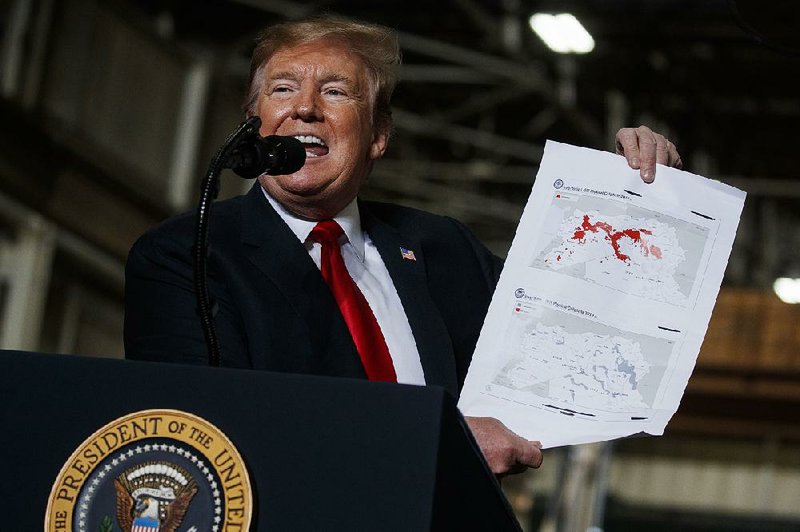WASHINGTON -- President Donald Trump said Wednesday that the last territory in Syria held by the Islamic State would be "gone by tonight," despite reports of continuing fighting between the extremist group and U.S.-backed local forces in Syria.
It was the second time in the past month that Trump was ready to declare the liberation of the extremists' self-declared caliphate -- an area once roughly the size of Britain -- across Iraq and Syria. In February, at a military base in Alaska, he said the Islamic State's territory in Syria had been "100 percent" reclaimed; the group no longer controls land in neighboring Iraq.
In Syria, officials with the U.S.-backed Syrian Democratic Forces near the last pocket of extremist-controlled territory said Wednesday that a group of Islamic State fighters still controlled a sliver of land along the eastern bank of the Euphrates River, where they were holed up with women and children.
As long as that area was still under the Islamic State's control, "it would be weird to expect an announcement in the next day," said a Syrian Democratic Forces official, who was not authorized to respond to Trump's comments and spoke on the condition of anonymity.
Ciyager Amed, an official with the Syrian Democratic Forces, said Wednesday that forces were still searching for any Islamic State militants hiding in tunnels in a riverside pocket in the village of Baghouz. The Syrian Democratic Forces held back on announcing victory over the Islamic State.
Trump, speaking to reporters before leaving the White House for a trip to Ohio, sought to prove that his earlier assertion had been correct -- or close to it. He brandished two maps showing before-and-after snapshots of Islamic State territory that he said proved that his administration had done more to eradicate the extremists than President Barack Obama had.
"This is ISIS on Election Day," Trump said, using an acronym for the Islamic State, as he pointed to one map, marked with red splotches that he said represented territory held by the extremists. "When I took it over, it was a mess."
Then he pointed to what he said was a Trump administration map, which he said was updated only 20 minutes earlier, with a red mark that indicated one small Islamic State-held village on the verge of collapse: "There is a tiny spot that will be gone by tonight."
For weeks, the Islamic State's remaining territory consisted of Baghouz, where fighting raged on and off, and tens of thousands of fighters, women and children surrendered and were taken to prisons and crowded refugee camps. The Syrian Democratic Forces recently pushed the last remaining fighters out of the village, leaving them only the sliver of territory by the river. It remains unclear how many people, both fighters and civilians, are there.
The Trump administration has been eager to announce the eradication of the militant group, even as concerns over its influence grows in other regions of the world.
Earlier this week, Abu Hassan al-Muhajir, the Islamic State's spokesman, belittled the White House's claim of victory over the terrorist organization. In a 44-minute taped speech after the deadly mosque shootings in New Zealand, al-Muhajir said the Trump administration had created a "state of confusion and contradiction that make it impossible for any observer to know what is meant by the word 'victory.'"
Trump also reaffirmed that 400 U.S. troops would remain in Syria, in part to ensure that the Islamic State does not resurge. He also said some U.S. forces would be based in an area of Syria that was "closer to Israel for a period of time," but he did not elaborate. His comments came as Secretary of State Mike Pompeo was meeting in Jerusalem with Prime Minister Benjamin Netanyahu of Israel.
In December, Trump declared he would immediately withdraw the 2,000 U.S. troops in Syria in an announcement that prompted the swift resignations of Defense Secretary James Mattis and Brett McGurk, the special presidential envoy to the coalition fighting the Islamic State. The decision was also roundly criticized by allies worldwide and the Syrian Democratic Forces, which has proved to be the most effective ground force against the Islamic State.
The Trump administration has since walked back the president's initial withdrawal announcement.
Information for this article was contributed by Philip Issa of The Associated Press.
A Section on 03/21/2019

